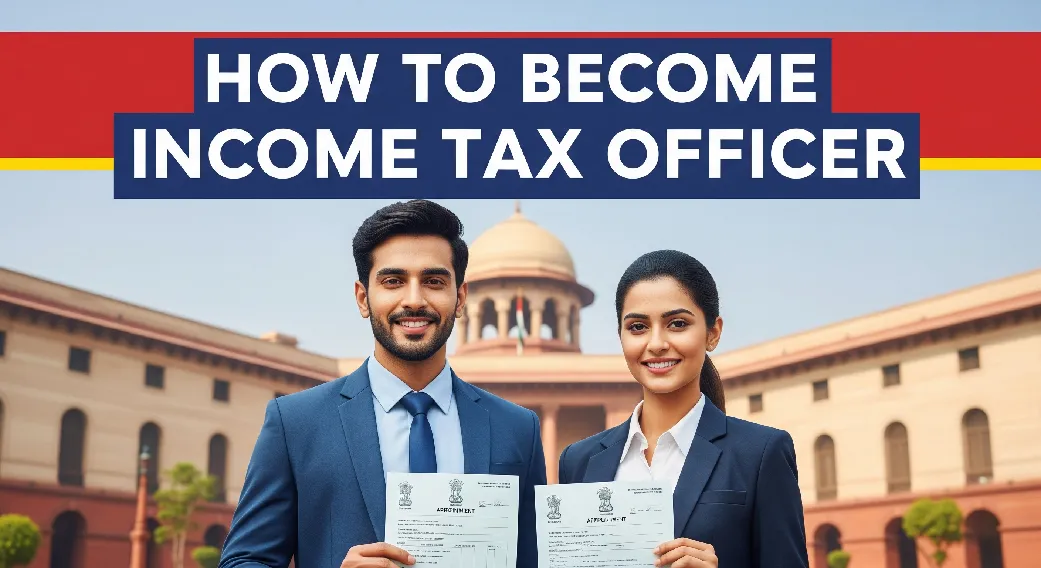Introduction
Who Is an Income Tax Officer?
An Income Tax Officer works under the Income Tax Department of India, which comes under the Central Board of Direct Taxes (CBDT). The primary responsibilities include monitoring, assessing, and collecting income tax, handling tax evasion cases, and ensuring compliance with the Income Tax Act. This makes the ITO a crucial part of the government’s financial system.
Income Tax Notice Salaried Employees Alert: Avoid Common Mistakes
Why Choose a Career as an Income Tax Officer?
- Job Security: Permanent government employment with retirement benefits.
- Respect and Authority: A prestigious post with decision-making power.
- Good Salary and Perks: Competitive pay scale, allowances, and housing benefits.
- Career Growth: Opportunities to rise to senior positions like Assistant Commissioner or Deputy Commissioner of Income Tax.
How to Become Income Tax Officer – Complete Roadmap
The Income Tax Officer post is mainly filled through the Staff Selection Commission Combined Graduate Level (SSC CGL)</strong) examination. Below is a complete step-by-step guide.
Step 1: Meet the Educational Qualification
You must hold at least a Bachelor’s degree in any discipline from a recognized university. Final year students can also apply provisionally but must present their degree before document verification.
Step 2: Check Eligibility Criteria
- Nationality: Must be an Indian citizen.
- Age Limit: 18–30 years (general category). Age relaxation applies for reserved categories.
- Physical Standards: Minimum physical fitness may be required for some posts (vision and height criteria are generally specified in the notification).
Step 3: Apply for SSC CGL Exam
The SSC CGL exam is conducted once a year. Candidates aspiring to become Income Tax Officer should select the relevant post in their application form. The exam has four tiers:
- Tier I (Preliminary Exam): Computer-based test covering Quantitative Aptitude, English, General Awareness, and Reasoning.
- Tier II (Mains Exam): Computer-based test with papers on Quantitative Aptitude, English, Statistics (optional), and General Studies (Finance & Economics).
- Tier III: Descriptive paper in English/Hindi (essay, précis, letter writing).
- Tier IV: Document verification and computer proficiency/skill test.
Step 4: Prepare Strategically
Preparation is crucial to succeed. Follow these tips:
- Focus on previous years’ question papers to understand the exam pattern.
- Improve your speed and accuracy in quantitative aptitude.
- Stay updated with current affairs and basic economics.
- Work on descriptive writing for Tier III.
Step 5: Clear Medical & Document Verification
After passing all tiers, you’ll undergo document verification and a medical fitness test. Once cleared, you’ll be allotted the post of Income Tax Inspector initially and later promoted to Income Tax Officer after departmental training and promotion exams.
Income Tax Officer Salary Structure
The salary of an Income Tax Officer is highly attractive. Here’s a breakdown:
- Pay Scale: Level 7 (₹44,900 – ₹1,42,400 per month) as per the 7th Pay Commission.
- Grade Pay: ₹4,600.
- Allowances: House Rent Allowance (HRA), Dearness Allowance (DA), Travel Allowance (TA), and Medical Benefits.
- In-hand Salary: Approximately ₹55,000 – ₹70,000 per month (depending on city of posting).
Additionally, Income Tax Officers enjoy job security, pensions, and other government perks.
Stock Splits Explained: How Adani Power’s Split Impacts Investors
Career Growth and Promotion
The Income Tax Officer post offers steady career progression:
- Income Tax Inspector
- Income Tax Officer (after promotion)
- Assistant Commissioner of Income Tax
- Deputy Commissioner of Income Tax
- Joint Commissioner of Income Tax
- Additional Commissioner of Income Tax
- Commissioner of Income Tax
Promotions are based on seniority, performance, and departmental exams.
Skills Required to Become a Successful Income Tax Officer
- Strong analytical and numerical skills.
- Attention to detail and ability to handle confidential information.
- Good communication and decision-making skills.
- Basic knowledge of accounting, taxation, and finance.
Preparation Tips for SSC CGL Income Tax Officer Post
- Plan a Study Schedule: Allocate daily hours for Quant, English, Reasoning, and GK.
- Use Reliable Study Material: NCERTs, previous year papers, SSC CGL guides.
- Mock Tests: Take weekly online mock tests to measure progress.
- Time Management: Practice solving questions within time limits.
- Stay Consistent: Persistence is the key to cracking SSC CGL exams.
Frequently Asked Questions (FAQs)
1. How many attempts can one make for the SSC CGL Income Tax Officer exam?
There is no fixed number of attempts. As long as you meet the age criteria, you can appear multiple times.
2. Can commerce students apply for Income Tax Officer posts?
Yes, graduates from any stream (including commerce) can apply.
3. Is there any physical test for Income Tax Officer?
Generally, there is no rigorous physical test, but candidates should meet the minimum physical standards mentioned in the SSC notification.
4. How long does it take to become an Income Tax Officer?
Usually, candidates start as Income Tax Inspectors and are promoted to ITO after 3–5 years of service, depending on vacancies and performance.
Conclusion
Becoming an Income Tax Officer is a prestigious and rewarding career choice. By meeting the eligibility criteria, preparing strategically for the SSC CGL exam, and staying consistent with your efforts, you can achieve this goal. With the right approach, you can secure a government position that offers job security, excellent pay, and opportunities for growth.
We hope this comprehensive guide on how to become Income Tax Officer has helped you understand the pathway clearly. Start your preparation today, and step closer to your dream job in the Income Tax Department of India.
